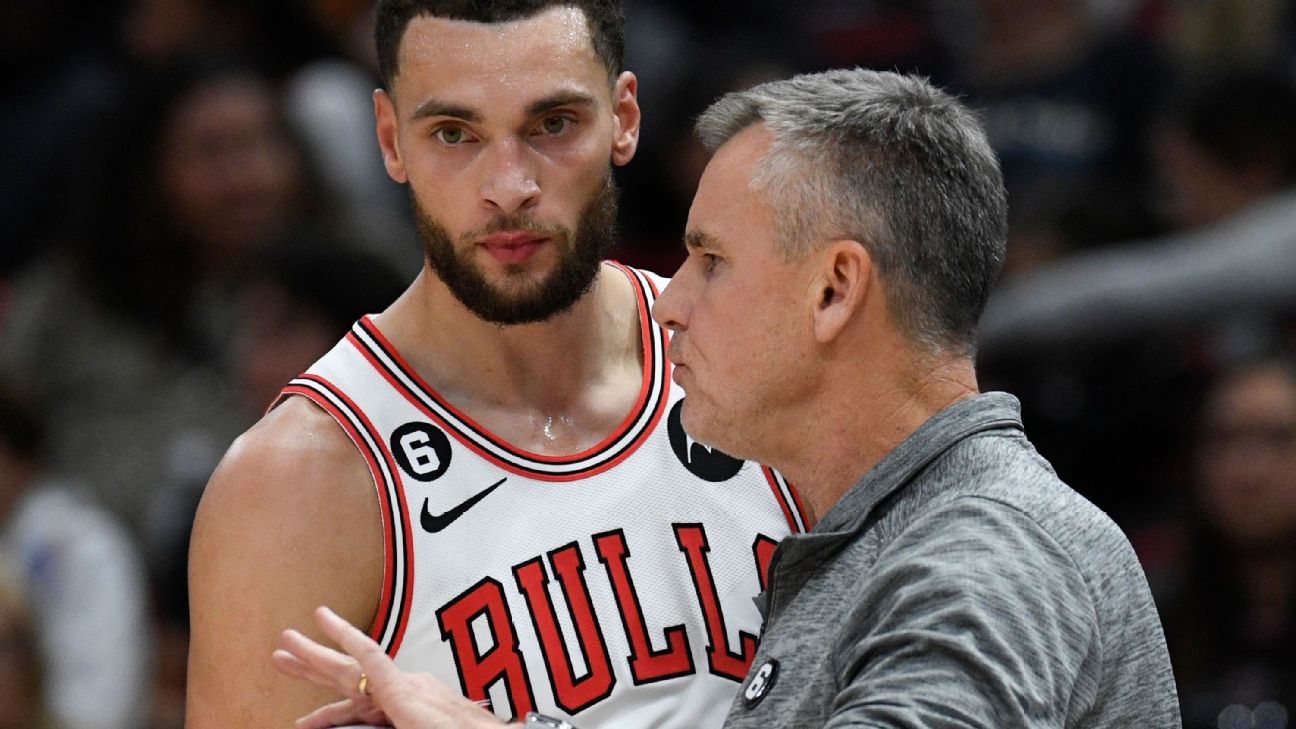Brian Windhorst and a team of ESPN's Insiders sort out life and the news from in and around the NBA world, including a massive decision in Chicago, G League experiments and some head-scratching moves for the Charlotte Hornets.
"Be first, be smarter or cheat," actor Jeremy Irons' character says in a speech on how to be successful on Wall Street, a scene from the movie "Margin Call" that has become legendary in finance circles and especially the kicker:
"It sure is a hell of a lot easier to just be first."
This is the uncomfortable game developing in some NBA front offices as a long, cold winter sets in. Which team will be first to take its players to the trade market?
As the transaction season opened last week, when most players who signed contracts signed last summer became eligible to be moved, numerous league executives reported the same thing to ESPN:
There are no sellers.
The standings are bunched, star injuries have delayed decisions and after several years of heavy draft pick trading, there is a dearth of available first-round picks, the most valued currency in rebuild trades.
There is, however, one team being watched more than all others: the Chicago Bulls.
The Bulls are facing a potentially grueling crossroads. A trade they made two seasons ago for Nikola Vucevic means their draft pick will go to the Orlando Magic this year unless it falls among the top four picks. This provision was a footnote after last season's 46-36 campaign, but it now hangs over them.
Dating to last summer, league executives wondered whether the Bulls might end up on the playoff bubble in the Eastern Conference after several 2021-22 teams that finished behind them in the standings upgraded their rosters and the Bulls just spun in place. For now, they're 29 games into the season and outside the play-in line.
Their situation worsened when Lonzo Ball, who had proven to be an important player, needed a second knee surgery that has left the point guard without a timetable for return and in a very deliberate rehab process.
The Bulls (11-18) started this week with the league's seventh-worst record, in no small part because they weren't able to acquire an effective replacement for Ball this offseason. They now are uncomfortably forced to look at the reverse standings. The lottery odds in their position have them with a slightly better than 30% chance of keeping their pick if they stay in that spot, which means they'd be 70% likely to lose it to Orlando.
Talking about maximizing these odds is unpalatable, especially when at best it's a coin flip. The teams with the league's four worst records at season's end have at least a 50% chance of staying in the top four.
A coin flip for draft prospects Victor Wembanyama, Scoot Henderson or a player such as Amen Thompson or Ausar Thompson isn't the worst gamble in league history, of course, but it's still not a great sell to your fans or your ownership.
The issue, though, is the Bulls just might not have a good enough team to compete in the loaded East. Their ceiling might be limited regardless of the draft pick situation. Zach LaVine, who signed a five-year, $215 million deal in the offseason, has been sluggish in recovering from offseason knee surgery.
In a league largely driven by the 3-pointer, the Bulls are last in attempts and 27th in makes. They're in the bottom 10 in offense and the bottom 10 in rebounding percentage. Last season, the Bulls piled up close-game wins, ranking third in the league in NBA clutch rating. This season, they're 20th in that category and 3-8 so far in games decided by five points or fewer, all this despite having one of the league's best clutch players in DeMar DeRozan.
Sunday night in Minnesota, playing against a Timberwolves team missing multiple star players, the Bulls gave up 150 points.
They have problems, regardless of worrying about where their pick might end up. This team, which was constructed to be a contender, is not and doesn't appear to be headed there in the short term.
There are teams out there that would covet playmaking veteran DeRozan (the Los Angeles Lakers would be high on the list) or defensive specialist Alex Caruso, who is on a team-friendly contract. Vucevic, a scoring big man in the final year of his contract, is a classic target contenders have been willing to pay for at the deadline for decades.
The Bulls could perhaps find real value if they started talking calls. With Chicago out an additional future first-round pick owed to the San Antonio Spurs, picking up draft picks could be helpful going forward. Chances are competition might develop with so many teams looking for help in a talent arms race.
Then again, the length of the NBA schedule allows for recovery; there is time. There's valor in that choice, too, trusting the roster. And trusting coach Billy Donovan, who got a big vote of confidence in the form of a contract extension last summer. Leaning on some early-season success, such as when the Bulls beat the NBA-best Boston Celtics twice and won in Milwaukee, and believing it could be recaptured.
Then again, it's a lot easier just to be first.

Here's NBA insider Kevin Pelton on a G League experiment taking center stage this week:
Target practice at the Winter Showcase
Quietly, the NBA is conducting a fascinating experiment this season in the G League.
All overtimes are being played using a target score -- often referred to as the Elam ending -- instead of a clock, and during this week's G League Winter Showcase games, the target score will replace the clock for the fourth quarter of regulation.
The NBA had introduced the target score during the All-Star Game in 2019, extending it to the reformatted Rising Stars Challenge last season. But the G League experiment is a key step in the path between using it for exhibitions and perhaps someday bringing it to NBA games that count.
Whatever the timetable for that possibility, overtime is a likely first step. Using the target score for extra sessions solves the biggest challenge to adding the target score ending: How to balance the target between giving the leading team an edge and maintaining a chance for trailing teams to come back.
Applied in a tie game, there's no such problem. And using the target score to break ties prevents the possibility of extended, multiple-overtime games, which present a greater problem as teams pay increasing attention to their players' minutes.
In the G League, where overtime sessions were previously two minutes as compared to the NBA's traditional five minutes, the target score was set at seven points to ensure teams need at least three different scores to win.
That has lengthened overtimes a bit. For statistical purposes, the G League is tracking minutes played in OT, which has ranged from 1.2 minutes at the low end (both teams scored on all their possessions) to five at the high end. On average, it has taken a little less than three minutes for teams to reach seven points, suggesting the NBA would probably want to set a target score for overtime around 11 points to approximate a five-minute session.
The track record of the G League as a laboratory is mixed. The coach's challenge and transition take foul rules have been promoted, among others, but there's no reason to believe we'll see one free throw for all possible points in the NBA any time soon despite that rule being used in the G League since 2019-20. And the then-NBA Development League's trial of having 3-pointers count only in the last three minutes of quarters was quickly consigned to the dustbin of history.
After NBA executives and scouts get a long look at the target score in action this week in Las Vegas, we should have a better idea which of those paths the league might take with target scores.

And here's front-office insider Bobby Marks on the morass going on with the Hornets:
Charlotte caught in a web of woes
There is no denying Michael Jordan is one of the greatest, if not the greatest player in NBA history.
The elite status is a reason the NBA recently named its MVP trophy after him.
As owner of the Charlotte Hornets, the results on the court have been a failure since he took over in 2011.
Not only do the Hornets have the league's second-worst record at 8-23, but since 2011, they have the 25th best winning percentage (a kind way of saying sixth worst) and they have not appeared in the playoffs since 2015-16 (the second-longest drought behind the Sacramento Kings).
To make matters even worse, Charlotte has not won a playoff series (it has won a total of three playoff games) since returning to the NBA in 2004-05.
It appeared in the play-in tournament the past two years but was blown out by a combined 56 points.
To sum it up, if Charlotte was a European soccer team, the likelihood is that, over the past 18 seasons, it would have been relegated to a lower division.
The ineptitude is a result of poor roster construction that traces back to the 2004 draft and continues now.
In the past 18 seasons, Charlotte has drafted in the top 10 11 times, with nine of those players never appearing in an All-Star game during their time with Charlotte or their next team(s).
Their three recent first-round picks, James Bouknight, Kai Jones and Mark Williams have failed to crack the rotation this season.
Outside of 2020-21 Rookie of the Year LaMelo Ball and forward P.J. Washington, the roster consists of sixth men disguised as starters (sorry, Gordon Hayward, Terry Rozier, Mason Plumlee and Kelly Oubre Jr.).
Miles Bridges, whom the Hornets thought of as a foundational player, was arrested before the start of free agency and eventually pleaded no contest to felony domestic violence charges. His status in Charlotte is uncertain and even if he does re-sign, he will likely face a lengthy suspension.
The roster futility is not a result of a midmarket team like Charlotte not having the same spending power as teams in the luxury tax, such as Boston, Brooklyn, Milwaukee and Philadelphia.
Two of the top teams in the Western Conference, Memphis and New Orleans, are smaller-market franchises that, rather than attracting top-tier free agents, have built their rosters through the draft and shrewd trading. Neither team is in the luxury tax this season.
The good news is Charlotte has a 12% chance of drafting a franchise player, such as Victor Wembanyama.
The bad news is that if history is any indicator, expect another missed opportunity for the Hornets.

